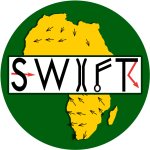The UK benefits from some of the best forecasting in the world and the UK Met Office is estimated to bring £3 billion of benefit to the UK economy every year. In Africa, the impacts of weather are much higher due to the severity of weather extremes such as storms, droughts and floods, and to the vulnerability of impoverished people. Comparable benefits in Africa to those seen in the UK require significant improvements in the skill and capability of the forecasts.
Funded by the Global Challenges Research Fund the African SWIFT programme aimed to create the infrastructure for this improvement with its team of 25 UK and 45 African atmospheric scientists, social scientists and operational forecasters. The team undertook fundamental scientific research into the physics of tropical weather systems; evaluation and presentation of complex model and satellite data; and communication and exploitation of forecasts.
The GCRF African SWIFT team worked with forecast users across sectors from aviation to agriculture, energy, water and emergency response to understand how to tailor the provision and delivery of weather forecasts and to ensure improved response to high-impact events (e.g. onset of rains, heat-waves, dry spells, strong winds); rapid emergency response to extreme events, such as urban flooding and prolonged droughts; and increased resilience, through integration of weather prediction into strategies for response to climate change.
Although African SWIFT has now completed its programme of work, there is on-going work to build on the advances in capacity and infrastructure in Africa that have been put in place. New developments, such as the FASTA app, are translating our research into practical solutions to improve weather forecasting for Africa. The FASTA app uses satellite data to provide highly-accurate short-term weather forecasts, known as nowcasting, that can help to protect lives and livelihoods in Africa.
The GCRF African SWIFT consortium built upon existing partnerships between forecasting centres and universities in four African partner countries – Senegal, Ghana, Nigeria and Kenya – bringing together 5 UK partners (NCAS, University of Leeds, University of Reading, CEH, UK Met Office), 10 African Partners (ACMAD, ICPAC, ANACIM, UCAD, GMet, KNUST, NiMet, FUTA, KMD, and University of Nairobi) and the UN World Meteorological Organisation (WMO) as an advisory partner.
